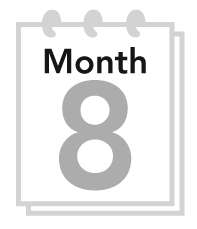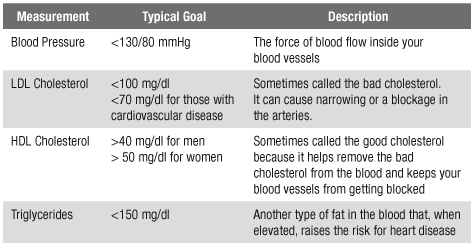
This month we take a look at two more topics that require your attention for your entire life—your healthy heart and how to confidently say “no” to intentional or well-meaning diet saboteurs.
For the Long Haul: Keep Your Heart Healthy
There is so much emphasis on weight management and blood glucose control—even in this book—that it’s easy to forget that your blood pressure and cholesterol levels are equally important. People with diabetes are at a much higher risk for heart disease than individuals without diabetes, so pay as much attention to your heart health as you do your blood glucose and weight. Fortunately, the steps you take to manage one aspect of your health trickle into other areas. Being physically active helps with weight control, boosts insulin sensitivity, lowers blood pressure, and improves cholesterol levels. Losing weight improves diabetes control, blood pressure, and HDL (high-density lipoprotein or good) cholesterol levels. Trimming saturated fat from your diet can lower your LDL (low-density lipoprotein or bad) cholesterol and improve glucose control by making insulin work better. Additionally, you can help control your blood pressure by cutting back on sodium and by eating plenty of fruits and vegetables. These are all strategies we’ve talked about already in the book. Just take them to heart and keep working hard. And for the sake of your heart, remember to take blood pressure and cholesterol medications as prescribed by your physician.
Discuss your target blood pressure and cholesterol levels with your physician. Ask how often you should have them measured. The ADA recommends the following targets.

It’s hard enough to turn down offers of your favorite foods without the extra pressure from family and friends. How can you turn down Grandma’s warm-from-the-oven apple pie when she says she made it just for you? There is no easy answer for this. Clearly, however, you must keep in the forefront of your mind that your health matters, that what you eat matters, and that you matter. The tactics you use to say “no thanks” will vary depending on your situation. Some of the following may help you. Practice them before you’re facing diet sabotage.
• Simply say “no, thank you” without an explanation. If that doesn’t work, add that you’re watching what you eat and thank the person for his or her understanding.
• Sandwich “no, thank you” between two compliments.
—“It looks and smells fabulous, thanks. Too bad I’m already full. I can’t wait until you make it again, though.”
• Throw the blame elsewhere.
—“I’d love to, but I promised my doctor I’d be extra careful before my next appointment.”
• Ask to take some for later. You can either get rid of it or save it until a more appropriate time to eat it.
• Ask for just one bite.
• Take the food and toss it when no one is looking.
• Ask for support.
—“I’m trying so hard to watch what I eat, and it’s incredibly difficult.
 It’s important to get your friends and family to be your allies. Tell them you need their help. There are some diet saboteurs out there. They may not even realize that’s what they are. But when they say “hey you’ve done so well, you deserve this treat” or “come on, it’s only once in a blue moon,” it’s a real obstacle to losing weight and controlling blood glucose. I’ve discovered that the best road is to elicit their help by explaining the situation and the consequences of not following the diet plan. Giving them the chance to rise to the occasion may turn out to be a blessing for them as well. You can help me by not offering me snacks and sweets.”
It’s important to get your friends and family to be your allies. Tell them you need their help. There are some diet saboteurs out there. They may not even realize that’s what they are. But when they say “hey you’ve done so well, you deserve this treat” or “come on, it’s only once in a blue moon,” it’s a real obstacle to losing weight and controlling blood glucose. I’ve discovered that the best road is to elicit their help by explaining the situation and the consequences of not following the diet plan. Giving them the chance to rise to the occasion may turn out to be a blessing for them as well. You can help me by not offering me snacks and sweets.” Continue the following goals: _____________________________________________________________
Continue the following goals: _____________________________________________________________